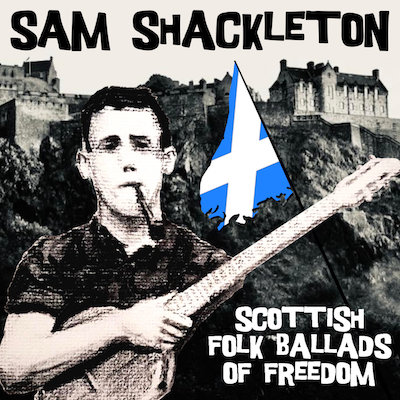
Following on from Sam Shackleton‘s highly acclaimed debut album ‘Causeway Recordings‘ earlier his year, his new EP, Scottish Folk Ballads of Freedom, finds the Stirling-born musician drawing on his masters in Scottish ethnography for a collection of his arrangements of Scottish folk ballads taken from the work of, among others, Robert Burns and the legendary poet, songwriter, and folklorist Hamish Henderson, as well as songs inspired by Ewan MacColl, Hamish Imlach, Matt McGinn; all delivered with his distinctive clawhammer banjo and broad Scottish brogue.
Inspired by Ewan McColl’s reading (itself acknowledging Henderson’s singing), he opens with Johnny Laddie, a Glasgow street song about a wily womaniser which he has completely rewritten, following on with the banjo-driving Tramps and Hawkers, a ‘come ye’ number with an added “too ma ree” refrain, the authorship of which has been lost to time but refers to the heyday of the traveller when itinerant workers were an essential part of the rural workforce (the track can also be heard on the latest Folk Radio show here).
Taken at a brisk strummed rhythm with drone backing, the anti-war/anti-capitalism ballad Freedom Come All Ye was written by Henderson in 1960, a lecturer and research fellow at the School of Scottish Studies from where Shackleton graduated. The song is regarded by many as Scotland’s international anthem.
An equally energetic rhythm drives along Ye Scottish By Name, another song about Scottish freedom, is a reworking of the folk ballad Ye Jacobites By Name, itself rewritten for an earlier ballad and popularised by Burns, who is also the author of the guitar strummed sway along closer Highland Widow’s Lament, sharing a similar background as a widow laments the loss of her husband and the defeat of the Jacobites at the battle of Culloden in 1746.
Sandwiched between, he delivers a jogging banjo version of MacPherson’s Rant, a tune said to have been composed by James Macpherson, the famed 17th-century Scottish outlaw. On the eve of his execution at Banff in November 1700, accused of robbery and convicted of being a gypsy, then a criminal offence in Scotland, MacPherson played the tune on the gallows before offering his fiddle to anyone that would play it at his wake. When none came forward, he broke the fiddle. A pardon was allegedly on the way, and when a rider was spotted, the village clock was put forward by 15 minutes to speed up the execution.
Steeped in Scottish history and folklore, Scottish Folk Ballads of Freedom is further evidence of Sam Shackleton’s singular approach and, judging by his growing @Sorleythebard TikTok account, eminence far beyond folk circles.
